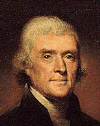
In the 1760s and early 1770s, Americans were increasingly outspoken in their criticism of the British crown. But most colonials continued to hope for a peaceful resolution to their complaints—even following the outbreak of hostilities at Lexington and Concord in April, 1775.
Thomas Jefferson, too, hoped for reconciliation with the crown long after the war began.
"I hope the returning wisdom of Great Britain will, ere long, put an end to this unnatural contest,"1 he wrote in August 1775. But he didn't want reconciliation at any price. He said he "would rather be in dependence on Great Britain, properly limited, than on any nation upon earth, or than on no nation. But I am one of those, too, who, rather than submit to the rights of legislating for us, assumed by the British Parliament, and which late experience has shown they will so cruelly exercise, would lend my hand to sink the whole island in the ocean."2
Within a few months he was leaning much more in favor of independence.
"In an earlier part of this contest, our petitions told him that from our King there was but one appeal. The admonition was despised, and that appeal forced on us. To undo his empire, he has but one truth more to learn; that, after colonies have drawn the sword, there is but one step more they can take. That step is now pressed upon us by the measures adopted, as if they were afraid we would not take it. Believe me, dear Sir, there is not in the British empire a man who more cordially loves a union with Great Britain than I do. But by the God that made me, I will cease to exist before I yield to a connection on such terms as the British Parliament propose; and in this, I think I speak the sentiments of America."3
Jefferson soon would be "speaking the sentiments of America" very openly indeed: as the author of the founding document of the united (small "u" in those days) States, the Declaration of Independence. Jefferson almost missed getting the job: he was out of the loop on much of the discussion about independence. And when he learned that a new government was forming in Virginia, he was eager to return home to Virginia to help write the state's constitution.
But when those plans fell through, he stayed on in Philadelphia instead. (He did send a draft constitution to Virginia by courier.)
On June 7 Richard Henry Lee, a fellow Virginian, introduced a resolution in the Continental Congress calling for independence. Jefferson kept notes of the proceedings.
Benjamin Franklin was one candidate to draft the necessary declaration, but he was under the weather at the time. John Adams and Thomas Jefferson were the next obvious possibilities.
Jefferson recorded only that "[t]he committee ... desired me to do it."4
His colleague John Adams provides a few more details for us, however:
Jefferson proposed to me to make the draft. I said, "I will not." "You should do it."
"Oh! no." "Why will you not? You ought to do it." "I will not." "Why?"
"Reasons enough." "What can be your reasons?"
"Reason first—You are a Virginian, and a Virginian ought to appear at the head of this business. Reason second—I am obnoxious, suspected, and unpopular. You are very much otherwise. Reason third—You can write ten times better than I can."
"Well," said Jefferson, "if you are decided, I will do as well as I can."5
Thus, we owe the Declaration of Independence not only to the ability and wisdom of Thomas Jefferson, but also to the graciousness of an admitted boor.
Copyright © 2000, The Daily Objectivist - Reprinted with permission of The Daily Objectivist and Davidmbrown.com.
21 Jan 2009 (last edit: 9 Jan 2024)
You can assist the work of Freedom Circle by purchasing one of the works discussed above:
-
Memoir, Correspondence, and Miscellanies, from The Papers of Thomas Jefferson
-
The Works of John Adams, Second President of the United States
-
Thomas Jefferson, "Letter II: To John Randolph, Esq.", Memoir, Correspondence, and Miscellanies, from The Papers of Thomas Jefferson, Thomas Jefferson Randolph (editor), Boston: Gray and Bowen, 1830, p. 150. (Freedom Circle note) ↩︎
-
Ibid., p. 151. (Freedom Circle note) ↩︎
-
Jefferson, "Letter III: To John Randolph, Esq.", Memoir, p. 153. (Freedom Circle note) ↩︎
-
Jefferson, "Memoir", Memoir, p. 14. (Freedom Circle note) ↩︎
-
Charles Francis Adams, The Works of John Adams, Second President of the United States: With a Life of the Author, Notes and Illustrations, by his Grandson, Vol. II, Boston: Charles C. Little and James Brown, 1850, p. 514. (Freedom Circle note) ↩︎
